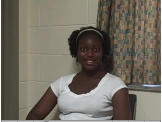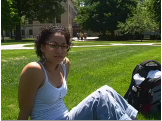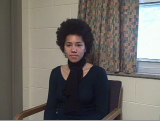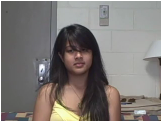Navigation:
Video Segment 1: Who are you?
Video Segment 2: What were your parents' attitudes toward literacy and/or education?
Video Segment 3: How would your life be different if you didn't know how to read and write?
Video Segment 4: What is your experience with and attitude toward computers?
Lessons 1 & 2: Narrating Technology Use
Lesson 3: Technology Resistance
Lesson 4: Complexity of Technological Engagements
Working Definitions of Technological Literacy and Narrative Analysis
The first student, whose name was withheld from the archive at her request (I have assigned her a pseudonym), grew up in New Jersey and is currently a student at University of Illinois-Urbana/Champaign. Jacobs describes herself as being from a "crazy family" and being particularly close to her sisters. She speaks of loving school as a child and enjoying writing more than reading. She also notes that, through her church, she learned to read the Bible on a daily basis, a practice she continues today. She describes her summer research project as a study of race and the use of hip-hop in pro- and anti-tobacco ads.
Chanelle Mays, from Michigan, describes herself as a linguistics major studying at Ohio State. As a child, she was "loud." She learned to read at the age of two and attributes both her early reading and her writing efforts to her mom, who, she says, did not finish college but who wanted Mays to take a different path. Mays mentions being in an interracial family with a black father and a white mother and notes that her mom "got a lot of flack" for dating her father in high school. She recalls always loving reading and writing, both for school assignments and outside school. Her summer research project was in the field of linguistics, where she looked at the acquisition of Mandarin Chinese by children. Mays used software to measure the waveforms and energies of enunciations.
Viktoriya Kamara is a philosophy and art history major at Northwestern University. She was born in Belarus and emigrated with her parents when she was eight. She describes her family as diverse; her father is West African and came to Belarus to study where he met her mother. Kamara describes her dad as coming from a poor, uneducated village family and noted that he worked very hard in school to be noticed and obtain access to further education. Her mother, Kamara says, had a very "planned childhood" in the communist state. Both of her parents speak multiple languages, and Kamara is also multilingual. In her summer project, Kamara looked at Kant and the physical sciences, specifically comparing what physics as a discipline studies to what philosophy as a discipline studies.
Saffiyah Madraswala grew up in New Jersey and currently attends Barnard College where she majors in Women's Studies. Both of her parents emigrated to the U.S. in the 1970s--her father from Pakistan and her mother from the Philippines. She describes her parents as coming from "stereotypical third-world poor families." She recalls learning to read and write in school and notes that the texts she most wanted to read (popular magazines) as a young adult were deemed unacceptable by her parents. For her summer project, Madraswala analyzed data from interviews she had conducted earlier in the summer with female activists in the Philippines. These interviews focus specifically with the impact of anti-insurgency laws on feminist activism in that country.
These four young women all took part in the Summer Research Opportunities Program at The Ohio State University, an academic program intended to prepare undergraduate students from underrepresented groups for graduate work. The interviewer, Angelique Benton, also participated in the program. The insider status of the researcher may have shaped the ways in which the women presented themselves during these videotaped interviews.
The videos were shot on The Ohio State University campus; the interviews with Jacobs, Kamara, and Madraswala were shot in dorm rooms, while the interview with Mays was shot in a public space called the Oval, a grassy area where students congregate in the warmer months of the year. The fact that all interviews were conducted in what might be described as student spaces on campus adds to the student-to-student nature of these interviews.
Because Mays' interview was shot in a public space, the location may have contributed to the particularly short answers she provided. External factors may have shaped the other interviews in similar ways. Kamara's and Jacob's interviews appear uninterrupted, for instance, while some noise intrudes on Madraswala's interview. The relative lack of distractions for Jacobs and Kamara may have helped them focus on the interview questions.
Each of the videos follows a traditional interview format, with the interviewee in front of the camera and the interviewer behind. Although we hear Angelique Benton's voice, we do not see her in any of the interviews. In that sense she remains anonymous--we have no information about her age or race. However, because I met Angelique the summer she was conducting these interviews, I know that is African-American and was an undergraduate during the time she was completing this project.
The participants introduce themselves by stating their name, age, the school they attend and their major, and where they grew up. The interviewer then asks each interviewee to tell a story about herself and describe her family. All four participants stated they were either 20 or 21, all rising seniors at their respective institutions. The information from this first set of questions that is not included in the brief introductory videos is summarized below each woman's name.
Most of the subsequent questions that Benton asks focus on literacy experiences. Elaine Richardson argues that "attending to the literacy stories of African American students may help us to help students see how they are positioning themselves rhetorically, in academia, in the Black literacy tradition, and in the world" (Richardson "Coming" 160). As readers move through the next set of pages, how these women position themselves, at least for these interviews, may become clearer. I want to emphasize, however, that I am not suggesting that these narratives reveal an essentialized self. Instead, I would like to suggest that these interviews may be useful and interesting for the information they provide about how the interviewees strategically and rhetorically present a version of self and identity to this interviewer in a particular context. Indeed, at times, some interviewees even contradict themselves, which I will address in more detail later.
If you are interested in more information about how I theoretically frame my analysis, please go to "Working Definitions of Technological Literacy and Narrative Analysis." The page falls second to last in the left-hand navigation. From there, you can return here ("Video Segment 1") or move on to Video Segment 2.



